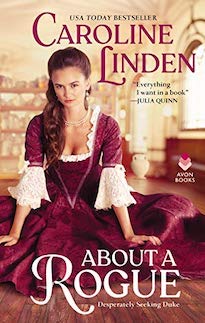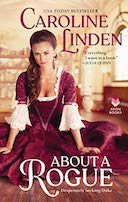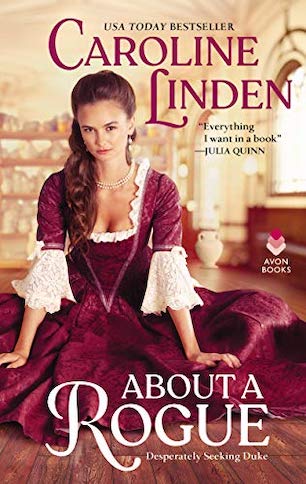 Maximilian St. James could see that his reputation had preceded him.
Maximilian St. James could see that his reputation had preceded him.
It was obvious in the face of the periwigged butler, stiff and disapproving as he ordered Max’s baggage conveyed to a guest room upon his arrival. He discerned it in the weary, jaundiced glance the solicitor gave him when they met, reminiscent of the tutors who had sized him up before trying, vainly, to instill in him some scraps of Greek and theology.
And he saw it mostly plainly in the face of the Duchess of Carlyle herself, who sat on her throne-like chair and fixed an unblinking, gimlet-eyed stare on him as if she expected him to slip pieces of the silver into his cuffs and steal them.
Well. Max was used to that. And he did not care.
After all, if the duchess didn’t want him here, she ought not to have sent a letter that strongly resembled a royal decree, imperiously demanding that he present himself at Carlyle Castle on this day, as if he were a servant or a dog to be summoned with a snap of her fingers.
It had, alas, pricked his curiosity just enough to make him respond to the duchess’s letter instead of tearing it in half in front of the stiff-lipped servant who delivered it. There was just enough suggestion of advantage that he couldn’t ignore it.
Max never ignored anything that could be put to his advantage. And this summons, for all its mystery and condescension, was very promising.
Thus far his instincts had seemed on target, both with regard to the mystery and the potential advantage. After a solitary breakfast this morning, he’d gone exploring. The castle was a sprawling pile of stone but pristinely maintained, with ancient tapestries on the walls and priceless antiquities on the mantelpieces. No bankrupt aristocrats here, but wealth and power in abundance.
 And while he was here… Max took the opportunity to look up someone he’d heard about all his life. Trailed by a stone-faced footman, he strolled through the castle corridors until he found the gallery.
And while he was here… Max took the opportunity to look up someone he’d heard about all his life. Trailed by a stone-faced footman, he strolled through the castle corridors until he found the gallery.
There was his quarry, at the far end of the gallery: the second Duke of Carlyle, his long curled wig cascading over his polished armor, his face narrow and almost delicate, save for the thin mustache along his upper lip. A length of fine linen or lace was carelessly knotted around his neck, and fields and hills—presumably Carlyle—spread behind him into the distance.
Max had always been well aware that a duke figured in his lineage. It had been his father’s favorite point of pride, and his mother’s main source of hope. He himself had used the fact to his benefit whenever possible, with the occasional fond thought for the ancient Frederick Augustus, whoever he was. Invoking his name, and hinting that Max was still close to the ducal branch of the family, had got him out of more than a few scrapes, even if it had never once led to actual improvement in his circumstances.
He studied the man, his great-great-grandfather. Was there some resemblance? He doubted it. That fellow posed with arrogant command, confident in the wealth and power he held. Max, on the other hand… Too many scoundrels and hellhounds, all of them penniless, had come between the two of them for any kinship.
“Cheers,” he quietly told the painting, giving his ancestor a brief nod. Then he turned and walked away.
And now he sat in an ornate salon, enduring the suspicious eyes of his hostess with a faint smile, waiting. The duchess sat on an elaborately carved chair that would have made the Queen herself envious. She was a plump old lady, seventy if she were a day, her gray hair frizzed and piled fashionably high. Even though it was morning she wore a black silk gown, and the rings on her fingers could have kept even a very rakish gentleman in style for a year. Max could see the toes of her slippers, propped up as they were on a lavish gilded footstool, and the diamonds on her shoe buckles glittered at him.
The solicitor sat at her elbow, a sober fellow in unrelieved black. The morning sunlight shone on the thinning hair atop his head. He was busily making notes on the papers in front of him, and only when he glanced up appraisingly did Max suspect that the notes were about him.
Another guest had arrived, presumably just this morning. He hadn’t been at breakfast two hours ago, and there was still dust in the creases of his trousers, as if he’d hastily brushed them while still wearing them. He was taller than Max and surely outweighed him by a few stone, a rough-looking common sort of fellow. A soldier, was Max’s idle guess, even though the man wore regular clothes. He had that way of sitting in his chair that suggested he was accustomed to a sword on his hip. He must also have been summoned, for he took the chair beside Max’s and faced the duchess.
No one bothered to introduce them.
“Good morning,” said the duchess abruptly, before the two men could do more than exchange polite nods of acknowledgement. “I trust your journeys were without incident.”
 Max’s mouth curled. On the godforsaken mail coach, until he managed to charm a nearby innkeeper’s daughter to let him have a horse on credit. The roads were atrocious, it had rained the first day, and if not for the accommodating innkeeper’s daughter, he would have arrived bedraggled and on foot, baggage in hand, like a traveling peddler.
Max’s mouth curled. On the godforsaken mail coach, until he managed to charm a nearby innkeeper’s daughter to let him have a horse on credit. The roads were atrocious, it had rained the first day, and if not for the accommodating innkeeper’s daughter, he would have arrived bedraggled and on foot, baggage in hand, like a traveling peddler.
“Yes, Your Grace,” said the soldier politely.
“It was perfectly delightful,” drawled Max. He crossed one leg over the other and draped his wrist over his knee, the picture of rakish insolence.
Her lips pinched at him. “Excellent. No doubt you wonder why I summoned you to Carlyle.” She turned to the solicitor. “Mr. Edwards will explain.”
The solicitor adjusted his spectacles. “On the fourteenth of April last, Lord Stephen St. James, youngest brother of His Grace the Duke of Carlyle, fell ill and died.”
The soldier had penetrating green eyes. He turned them on the duchess. “I offer my deepest sympathies, madam.”
“Thank you, Captain,” she replied. “That is very kind of you.”
“Unfortunately,” continued the solicitor, “Lord Stephen was His Grace’s nearest living heir. Carlyle himself has no children or wife.”
The soldier jerked in his chair with an audible intake of breath. Max flicked a glance at him, but his face was expressionless.
An odd thought lit up the back of Max’s mind. But no; it couldn’t be. He and the duke were only very distant cousins, and if anyone at Carlyle gave a damn what happened to him, they had never showed it. Eons ago, in Max’s childhood, his mother had appealed to Carlyle for aid, when his father had run off with another of his flirts and left them without money. He still remembered his mother’s tragic expression at the curt reply, with but five pounds enclosed. They had nearly starved that winter, being forced to stay with his mother’s family. Max’s father had returned home in the spring, drunk, penniless, and utterly unapologetic.
 He glanced at the soldier again. That one seemed to have a sense what was up. He sat as alert as a pointer, all but quivering with eagerness to please.
He glanced at the soldier again. That one seemed to have a sense what was up. He sat as alert as a pointer, all but quivering with eagerness to please.
Max shifted in his chair. The captain must be another St. James relation. Nearer, or more distant? he wondered. Because there was only one reason it could possibly matter to either of them that the Duke of Carlyle’s heir had just died.
And then the duchess confirmed it. “Lord Stephen has also left no wife or children. In their absence, it appears the dukedom will pass upon my son’s death to one of his distant cousins.” Her unimpressed gaze moved over each of them. “In short, to one of you.”
Blessed Christ and all the angels. Max’s heart skidded violently in his chest before he could rein in his reaction. A dukedom—and not just any dukedom, but Carlyle, large and prosperous.
But he did rein it in, because the next words out of the soldier’s mouth squelched his moment of euphoria. “That is most unexpected news, Your Grace,” he said in his deep, gravely voice. “May I inquire how…?”
“Certainly,” she said crisply. “Mr. St. James is the great-great-grandson of the second duke.” She raised her brows at him, and Max inclined his head in agreement. “And you, Captain, are the great-grandson of the third duke.”
So the soldier outranked him. Max silently let out his breath. It had been too incredible to be true.
“This is quite shocking news, ma’am,” replied the captain. If the news had shocked him, he had recovered well. “But is there no one—?”
 The solicitor cleared his throat and opened his mouth. “No,” said the duchess shortly. “There is no one nearer.”
The solicitor cleared his throat and opened his mouth. “No,” said the duchess shortly. “There is no one nearer.”
A weighty look passed between them, and then the solicitor picked up the thread. “As you may not know, His Grace the Duke suffered a tragic injury many years ago. It has rendered him unable to take a wife and father direct heirs, which means there is no chance either of you will be supplanted by an heir apparent.” He drew a wide sheet of paper from under his elbow and spread it on the front of the table, facing them. “I have taken the liberty of documenting the family here.” He paused as Max and the soldier leaned forward in unison, craning their necks to see. “This documentation will be invaluable when the time comes to assert a claim, particularly as neither of you is a direct descendant of the current or previous holder of the title.”
For the first time Max’s eyes met those of the captain. The other man looked as startled as Max felt. The Duke of Carlyle was incapable of fathering a child. His only heir was dead. And he was… Max took a brief glance at the neatly scripted family chart. The duke was nearly sixty years old.
This… this was a pressing concern, he realized.
“I see this has been something of a surprise to you,” announced the duchess into the silence. “It has been no less alarming to me.”
Max’s hackles rose. He knew exactly what she meant. It might not have been so horrifying to them if they’d taken any interest in him years ago. “I wouldn’t precisely call it alarming,” he drawled. “A surprise, I’ll grant.”
The duchess’s expression should have turned him into a pillar of ash. The solicitor sighed in disappointment. Even the captain gave him a disapproving look. Max simply smiled back at all of them.
“The rules of inheritance are firm,” said the duchess, still eyeing him with distaste. “The title and entailed lands must descend through the male St. James line, and they will. One of you will be the next duke—Captain St. James, most likely, or Mr. St. James in the event tragedy befalls the captain.” From her expression, Max thought she’d consider his inheriting a calamity verging on the apocalypse.
“There is a considerable fortune attached to the estate, naturally,” she went on. “It is an enormous responsibility, and neither of you have the slightest preparation to assume it.”
 “Naturally,” murmured Max.
“Naturally,” murmured Max.
“I have had both of you investigated,” she went on, ignoring him. “The results were hardly reassuring, but we must deal with what we must. Neither of you has taken a wife yet.”
“No, ma’am,” said the captain.
Max could hardly feed himself some months, let alone a wife and the children who usually followed. The duchess, with her jewels and satin-covered footstools, hadn’t the slightest idea about him. “Not one of my own,” he said languidly.
The silence was like a bubble of surprise. The lawyer took his meaning first, pressing his lips together and looking down. The captain cleared his throat, and the duchess glared daggers at him.
“Nor have you taken any pains toward respectability, sir,” she shot back. “That is what troubles me, and that is why I sent for you. The Duke of Carlyle wields great power, and must do so with dignity and decorum.”
Max thought of the last duke he’d seen—the young Duke of Umberton, gambling away eleven thousand pounds in one night and taking down his breeches to piss upon the faro table in a fit of pique. Dignity and decorum, indeed.
“It is an awesome responsibility,” the captain was saying, as sober as a judge, lapping up her words as if they were scripture. “I hope I may become worthy of it.”
His manner, obsequious to Max’s disdainful eyes, was nonetheless thawing the duchess’s frosty demeanor. She nodded at him. “I expect it of you, Captain.” The glance she gave Max was cold again. “And of you, Mr. St. James.”
He dipped his head in acknowledgement.
“I understand this may be a difficult request,” she went on. “I am prepared to help. Mr. Edwards will disburse to each of you five hundred pounds, immediately. I trust you will use it wisely, and return to Carlyle Castle in six months’ time more sober, refined gentlemen. If I am satisfied with your progress, I shall grant a further sum of one thousand five hundred pounds per year, to continue as long as you remain respectable.”
Good Lord. Five hundred pounds now, fifteen hundred a year. For a moment he couldn’t believe his ears.
But he had also heard the if in her statement, and realized this was not as heaven-sent as it appeared. “And if you are not satisfied?” he asked politely.
She sighed at Max’s question. “If you do not, you shan’t have a farthing more from me. Are you really so stupid to throw away such a chance, Mr. St. James?”
No, he certainly was not. Max tilted his head in deference. “I merely wished to know.”
“I shall monitor your progress during the next six months.” She shot him a look of warning. “I am not the enemy. This offer is intended to help you. Do not delude yourself that Carlyle runs itself, or that a steward can be hired to do it all. You are both young men, neither raised with this expectation. It will be difficult for you to adjust, but you must rise to the occasion. I urge you to accept this proposal and take it seriously.”
 The captain cleared his throat. “Yes, of course, Your Grace. It is extremely generous of you.”
The captain cleared his throat. “Yes, of course, Your Grace. It is extremely generous of you.”
“It is not generosity,” she retorted. “I have no wish to see Carlyle run into the ground. I wish to see it descend to someone who will appreciate its majesty, care for its dependents, and preserve it for future generations. To that purpose, you have six months to establish yourselves as someone capable of becoming that man. And you needn’t fear that the funds would cease if I should die,” she added, her dark eyes on Max again. “I will leave instructions in my will to continue the annuity so long as my conditions are met.”
Max no longer felt like taunting her. By God, he’d never imagined a chance like this. She meant it. When a man’s luck turned like this, only a fool would ignore it.
“What shall those conditions be, Your Grace?” he inquired.
“Respectability,” she said crisply. “No outrageous behavior. Sobriety. The Dukes of Carlyle have long held positions of power in Westminster, and you would do well to take an interest in politics so that you are prepared to acquit yourselves well when you sit in the House of Lords. If you do not, someone else will be happy to take advantage of you, sooner or later.” She paused. “And I have always felt a wife settles a man. The next duke will need a legitimate heir. A suitable bride is necessary, and I advise you to turn your attention to finding one.”
“We must marry?” asked the captain, a faint frown touching his face.
“The Duke of Carlyle will need an heir,” she repeated. “If you do not provide one, Captain, Mr. St. James would become the heir presumptive.”
Max and the soldier exchanged a fleeting glance. Not bloody likely, thought Max of his chances of becoming heir to the dukedom under that man. The captain was the sort who did what was expected of him. No doubt he was thinking of a woman right now who would leap at the chance to become his future duchess.
Not that Max could blame him. Everyone in this room knew he would be a terrible duke.
“Mr. Edwards will answer any further questions,” said the duchess as the clock chimed softly. She got to her feet, and a large ginger cat strolled from beneath her chair with a yawn and a stretch.
“If I may, Your Grace…” The soldier leapt forward to help her, bending solicitously near as he offered his arm. Max caught a few quiet words as they walked toward the door, and gathered the captain was concerned particularly about the question of a wife. Max could have sworn the fellow was asking the duchess to choose a woman for him.
 Thank God he wouldn’t have that problem. He turned to the solicitor, who sat with smooth hands folded neatly on his papers. “An annuity for good behavior.”
Thank God he wouldn’t have that problem. He turned to the solicitor, who sat with smooth hands folded neatly on his papers. “An annuity for good behavior.”
Edwards’s spectacles gleamed. “Her Grace wishes it.”
“And are you the man who shall judge that her conditions are met?”
“I am.”
“Marriage,” said Max thoughtfully. “Sobriety. Those are well-defined; a man is married, or he is not. He drinks, or he does not. Respectability…” He made an equivocating motion with one hand. “That is less objective.”
“I grasp your concern.” Mr. Edwards removed his spectacles. “My advice would be to consider whether or not you would be content to acknowledge your actions in the town square. If you would proclaim them proudly, I believe you’ll have little to fear from Her Grace.”
Max thought not. He thought that the duchess would be appalled by a solid half of the things he had done in town squares, to say nothing of what he’d done in gaming hells and theater boxes and pleasure gardens. But then, Her Grace had no conception of what his life had been.
“I see,” he replied politely to the attorney.
The captain was still speaking with the duchess, his shoulders hunched over as he bent his head down to hers. Max rested one hand on his hip and tapped his fingers. The velvet of his coat was worn there from the nervous habit. What was the captain so eager to know?
He couldn’t shake the feeling that the man was trying to steal a march on him somehow. But how? The captain, as the duchess had spelled out earlier, had a nearer claim than Max, and nothing either of them did would change that. The captain had the inside lane already.
But if the duchess approved of the captain’s bride, she might settle an additional amount on him. Was that what the man was after? Fifteen hundred pounds per annum was significant—a bloody fortune, in Max’s eyes—but it was surely a trifle to the mistress of Carlyle Castle. “Does she expect to choose our brides?” he murmured, only partly to the solicitor.
Mr. Edwards’s face grew pained. “Indeed not. Surely—surely you wouldn’t think of wedding an actress or a courtesan?”
 “No,” said Max, smiling faintly at the confirmation that the attorney did, in fact, expect him to do precisely that. “Nothing like it.” His gaze lingered on the captain. That fellow wanted the duchess’s approval desperately, and he wasn’t hiding it.
“No,” said Max, smiling faintly at the confirmation that the attorney did, in fact, expect him to do precisely that. “Nothing like it.” His gaze lingered on the captain. That fellow wanted the duchess’s approval desperately, and he wasn’t hiding it.
Max instinctively recoiled from doing the same. The duchess thought he was a thoroughgoing rogue already, incapable of making a correct decision. If the captain—who obviously stood far higher in her favor—allowed her to ride roughshod over him, she would think Max deserved it, too, if not worse.
Max wasn’t about to let the duchess, or anyone, pull his strings.
But perhaps…. perhaps she had handed him the chance to cut those strings once and for all.



